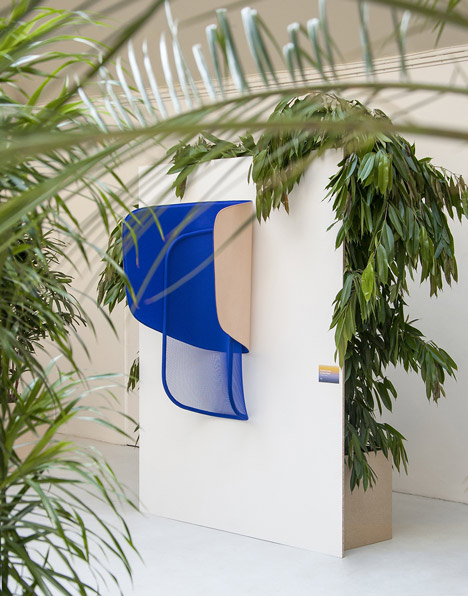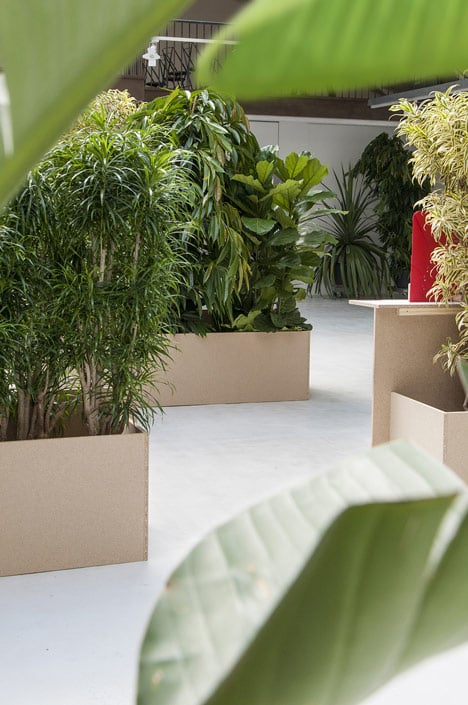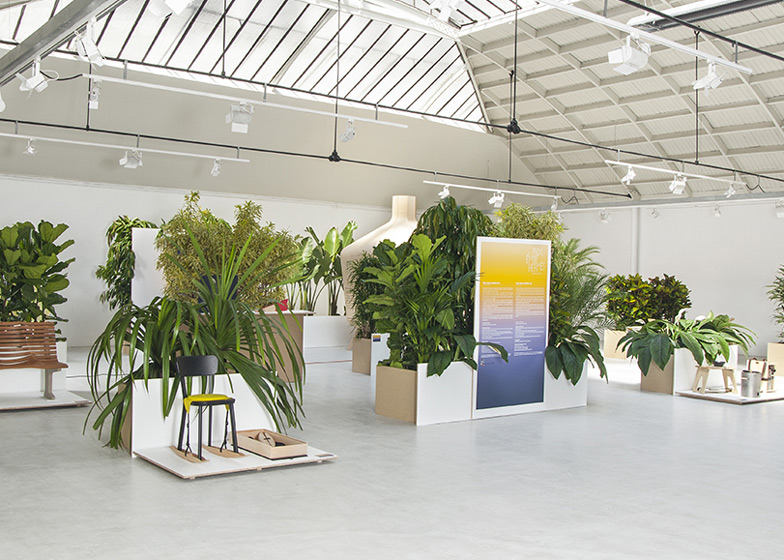Plinths filled with tropical trees and plants were designed by Swiss studio Big-Game, to showcase the finalists of a design prototype competition in Paris organised by fashion house Hermès.

The Prix Emile Hermès exhibition was part of the French biennial design festival D'Days, where designers were invited to create products that address a particular topic relating to modern life.

Big-Game was tasked with creating a suitable environment to match this year's theme of the exhibition, Time to Yourself, and designed an indoor retreat filled with exotic plants to exhibit the work of the twelve finalists.
"We wanted to bring a touch of nature and use plants to create a structure within the space," Elric Petit from Big-Game told Dezeen.
"The beautiful glass-roofed space in the centre of Paris becomes an oasis, giving visitors a chance to wander and discover the prototypes at their own pace – in accordance with the topic of the contest," he continued.
The studio collaborated with local craftsmen to produce plinths made from chipboard, concealing the plant pots beneath and providing a platform to exhibit and attach the designs.
"The stands are made from simple chipboard - a material considered as 'poor', but that we find beautiful when worked with precision and care," Petit explained.
The twelve shortlisted prototypes on display at the exhibition space in the Marais quarter of Paris include a rocking chair, fishing kit and pencil sharpener that doubles as a cup-and-ball game.
A timber cabin raised off the ground by wooden struts also nestles among the tropical plants and provides a sheltered retreat.
"Most of the prototypes are designed for relaxation or isolating oneself from the world," Petit said. "Their varied designs represent many different ways to suspend the suspend the relentless march of time."
The Prix Émile Hermès competition is chaired by Italian designer and architect Michele de Lucchi and features the work of independent designers from around the world.
Three designs shared the first prize. French studio Atelier Jes won with a wooden pod-like retreat called La Capsule ventilee, while Antoine Lesur and Marc Venot created a privacy "alcove" that can be attached to a wall.
Swiss designer Paul Tubiana's design is a cardboard screen that unfolds like a fan, creating a barrier between the user and whoever is in front of them.
Indian designers Suman & Poulami Biswas received an honourable mention for a fabric seat made entirely out of bamboo fibres that can be used like a cocoon.
Other designs include a pair of strap-on rockers that can be used on almost any type of chair leg by Paris-based Anais Benoit; a portable fishing kit by Austrian Maciej Chmara; a "hybrid rocking chair and hammock" by Spanish designer Sebastian Cordoleani; a private window seat made from tubular steel and elastic cord by Singapore's Kelvin Lim; multifunctional desk accessories by Colin Peillex from Switzerland; a wooden day bed by Ania Rosinke from Austria; a bamboo rocking lounger by Indian designer Yashesh Virkar; and a public bench designed to encourage single occupancy by Italy-based duo Sander Brouwer and Mara Ribone.
The shortlisted designs were chosen from seven hundred entries and funded by the Fondation d'entreprise Hermès, turning the designers' original concepts into prototypes for the exhibition.
The works were on display as part of the D'Days festival from May 19 to 22. The one week design festival takes place over public and cultural sites around France and promotes collaboration between artisan designers and contemporary artists.

